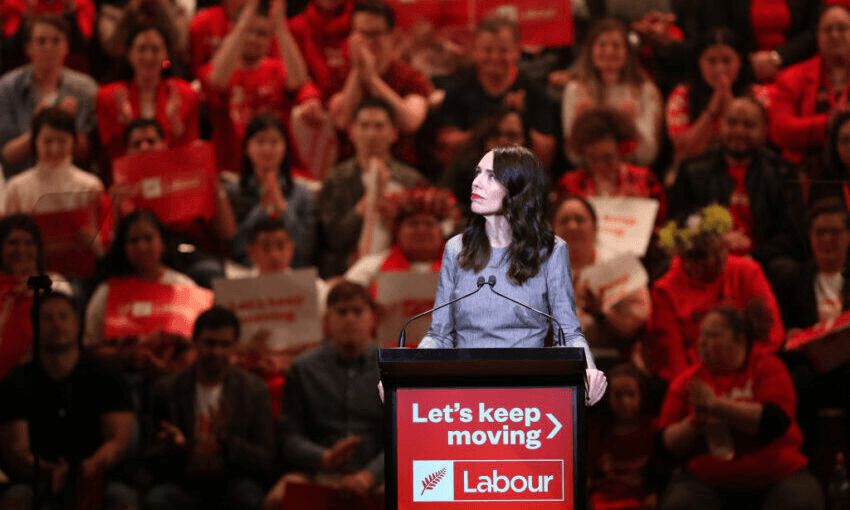The Labour leader returned yesterday to the Auckland Town Hall, where she was last seen riding the Jacindamania wave towards government. Toby Manhire went along to see how this campaign launch compared to the 2017 edition.
A lot was the same. The wash of red light bouncing off the Town Hall walls. The rapturous party faithful. Helen Clark worked the room. But where the Labour Party campaign launch of 2017 had a giddiness about it, the mood was different yesterday. There was still jubilation, to be sure, but where last time around it felt as if half the hall was pinching itself as it cheered, the sequel had a more steely confidence.
It was slicker, too – from the opening multi-media poetry performance that led into the mantra “let’s keep moving” to the well-drilled chants from the choral stalls on stage. Outside in Aotea Square a giant Jacinda Ardern beamed down from the Mid City wall. Inside, there were chevrons everywhere – diligently keeping moving across the screens in black and red and white. Even the lighting rig hovered over the stage like a chevron nod to a wharenui.
Ardern began her speech in 2020 by harking back to the 2017 event, reminding the crowd that there were many who said Labour couldn’t do it. A namecheck for Mike Hosking on that point competed with Clarke Gayford’s entertaining introduction for the biggest laugh of the afternoon.
The confidence is warranted. In the days leading up to the campaign launch in 2017, Labour was thrilled to hit 37% in the Colmar Brunton / 1 News poll; trailing National by seven points it was the party’s best poll result for years. In the days leading up to the campaign launch in 2020, a Colmar Brunton / 1 News poll put Labour on 53%, a full 21 points ahead of National.
Ardern and Grant Robertson, speaking to media after the launch, were at pains to say that there is no complacency in the Labour camp. Neither would entertain the idea of a one-party majority government – never had New Zealand seen such a thing under MMP, they stressed.
But if it was a more confident affair, it was also, at least by comparison to 2017, muted. There weren’t the epic queues down Queen Street or the spillover screenings in the Concert Chamber and Q Theatre. Ardern assumed very often a sombre tone. These are, after all, serious times. “There is more to do,” she said, solemnly, repeatedly. Oscar Kightley brought the laughs as MC, but he set the tone, too, by opening with what seemed almost an admonition: “We are gathered here today in total humility and focus.”
Speaking minutes after the daily Ministry of Health update arrived confirming the 99th day without Covid-19 in the community, Ardern announced that this is “a Covid election”. That may very well be a truism. It is also now very much a campaign message. Out with the relentlessly positive, in with a nation that relentlessly tests Covid-19-negative. As Ardern emphasised yesterday, the very fact of 2,000 people packed into a town hall in August 2020 would be unimaginable for much of the world. As long as that success is twinned in the public mind with Jacinda Ardern and Labour, it’s hard to see how they lose the election.
The credit was due to the “steady ship” of the “team of five million”, said Ardern early in her speech. A little later, the team and the steadiness was mapped directly on to Labour. “It’s about whether we stop and change to another team, or whether we keep those we know and we trust,” she said. These are exceptional times, no doubt, but these are also the words of the runaway favourite incumbent. Close your eyes and you could be hearing John Key in 2011 or 2014.
As it happened, Ardern’s kindness extended to paying tribute to John Key and Bill English for their management of the economy after the global financial crisis. The increasingly familiar bouquets of respect from Labour to the party of English and Key are of course a killing-by-kindness, in the implied shade thrown at those who followed them.
Judith Collins’ response to “this is the Covid election” will no doubt be “this is an economy election”, or maybe even “this is a jobs election”. The problem for the new National leader, however, is that just as distressing as the headline polling figures are the numbers that show, untypically, New Zealanders comfortably trust Labour over their rivals to manage the economy.
The policy centrepiece of the launch – a $300 million turbo-charging of the “Flexi-Wage” scheme to subsidise businesses taking on new workers – originated as a National policy, and it might easily have been something laid out by the coalition government in the course of the Covid response. That’s by design: it’s anything but business as usual in 2020, but this is crisis-response policy-making as usual.
There is, nevertheless, a campaign now properly under way. Ardern yesterday confirmed– in a rare moment of straying from her prepared speech – that the party would be presenting a full manifesto in the campaign. First, however, will be the policy that has so often proved the Labour campaign soft underbelly that gets a pummeling by National: tax. Labour doesn’t want to stand accused of prevarication or uncertainty and its tax policy, Ardern’s spokesperson confirmed to the Spinoff yesterday afternoon, will be revealed in the week to come.





